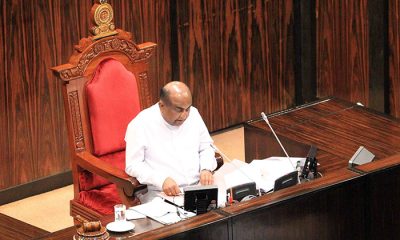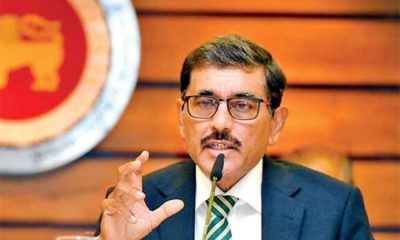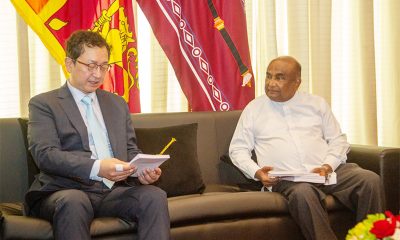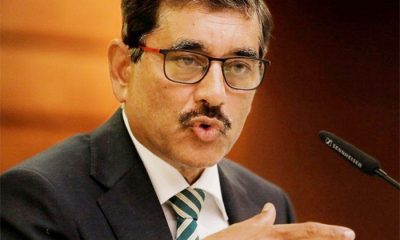Midweek Review
The Order of the Rising Sun conferred on former Governor of Central Bank, Sri Lanka
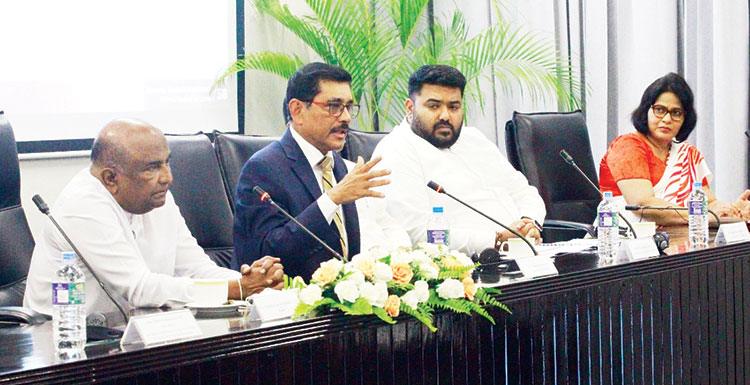
For the first time in parliamentary history, the Central Bank of Sri Lanka has issued a dire warning to Parliament and political parties therein over the responsibility on their part to ensure financial stability and discipline. Their failure to do so would trigger public protests again, they were told. There hadn’t been such a public warning. The warning was issued by no less a person than Dr. Nandalal Weerasinghe, Governor of the Central Bank, when he dealt with ‘Sri Lanka’s current economic situation and way forward’ on Aug 31.
By Shamindra Ferdinando
The Government of Japan, on August 22, conferred ‘The Order of the Rising Sun,’ Gold Rays with Neck Ribbon’ on Deshamanya Prof. Weligamage Don Lakshman, former Governor of the Central Bank (Dec 2019-Sept – 2021). Prof. W.D. Lakshman received the Japanese honour at a ceremony held at the residence of Japanese Ambassador Mizukoshi Hideaki. Kalyani Siriseeli Lakshman, the spouse of the emeritus professor, was conferred ‘The Order of the Rising Sun, Gold Rays with Rosette.’
The Japanese Embassy declared they were honoured for their distinguished contribution in promoting mutual understanding and friendship between Japan and Sri Lanka, through education.
‘The Order of the Rising Sun’ is awarded by the Emperor of Japan to foreign nationals who have made a distinguished contribution to enhancing friendly relations with Japan. The Japanese Embassy statement, dated August 22, also made reference to his tenure as the Governor of the Central Bank.
Before The Island dealt with Prof. Lakshman’s CBSL leadership, it would be pertinent to mention that Sri Lanka’s diplomatic relations with Japan suffered irreparable damage during this tenure when the former unilaterally cancelled the Tokyo-funded Light Rail Transit (LRT) project, after much groundwork had been completed. Dr. P.B. Jayasundera, the then Secretary to President Gotabaya Rajapaksa, in September 2020, just weeks after the UPFA scored a landslide victory at the last general election, issued instructions to terminate the Japan International Cooperation Agency-funded LRT on the grounds that it was ‘very costly and not the appropriate cost-effective transport solution for the urban Colombo transportation infrastructure.’
Recently, the former Chairman of the Committee on Public Enterprises (COPE) Prof. Charitha Herath, MP, asserted, in Parliament, that the cancellation of the LRT project still remained a mystery. The SLPP rebel alleged that even the person (Dr. PBJ) who issued instructions, in that regard, is silent over the circumstances leading to the cancellation of the project. Did President Gotabaya Rajapaksa, the Cabinet-of-Ministers, the Finance Ministry, or Dr. PBJ, who functioned as the President’s chief advisor on economic affairs, consult Prof. Lakshman and then Attorney General Dappula de Livera, PC, before rushing to that decision?
The Governor of the Central Bank heads the five-member Monetary Board. At the time Dr. PBJ issued instructions, as regards the termination of the project, the Monetary Board consisted of Governor Prof. W.D. Lakshman, S.R. Attygalle (both ex-officio), Sanjiva Jayawardena, PC, Dr. Ranee Jayamaha and Samantha Kumarasinghe.
During the COPE proceedings, in May this year, chaired by Prof. Herath, the parliamentary watchdog committee established failure as well as the responsibility on the part of the Monetary Board, Prime Minister Mahinda Rajapaksa (he held the finance portfolio at that time), the Cabinet-of-Ministers, and Dr. PBJ, for the current crisis. The incumbent Governor, CBSL didn’t mince his words when he, in response to questions posed by Prof. Herath and opposition SJB lawmakers, Patali Champika Ranawaka and Dr. Harsha de Silva, named those responsible. Soft spoken Dr. Weerasinghe didn’t hesitate at all when he identified Dr. PBJ as the one who blocked an early agreement between the government and the International Monetary Fund (IMF).
Of course reform medicines, that the Fund prescribes, are very bitter to swallow for those seeking its assistance and it is not short of critics around the world. And many of its patients, especially in Latin America and Africa, are yet in dire straits after swallowing its medicines for years, if not decades. Many of those countries have got some glimmer of hope only after countries like China came forth with generous aid projects, especially in the form of massive infrastructure developments, like railways, housing, etc., often criticized by the West.
Playing politics with a bankrupt economy
Recently some members of Parliament demanded an inquiry into the failure on the part of Dr. Weerasinghe to inform Parliament of the status of the economy. They found fault with him for declaring Sri Lanka’s inability to service foreign debt before bringing it to the notice of the House.
A section of the media reported that Dr. Weerasinghe is in a soup for not duly informing Parliament about the ground situation. Perhaps, the lawmakers had conveniently forgotten that the then President Gotabaya Rajapaksa had requested Dr. Weerasinghe to take over the leadership of the CBSL after the country became virtually insolvent, even unable to pay for basics from abroad. At the time Dr. Weerasinghe retired, in January 2021, he held the post of Senior Deputy Governor and received the top post on April 08, about a month before a humiliated Mahinda Rajapaksa quit the premiership. Just 72 hours later, the UNP leader succeeded Rajapaksa. Less than two weeks later, Wickremesinghe secured the finance portfolio, too.
In fact, by the time Prof. Lakshman quit, in September 2021, to pave the way for Ajith Nivard Cabraal, who previously served as the Governor CBSL from 2006 to 2015, to return to the same top post, the economy was in tatters. Cabraal’s much publicized six-month roadmap didn’t change a thing. The ruling SLPP continued to engage in silly propaganda as the situation deteriorated, rapidly; by the time President Rajapaksa’s government approached Dr. Weerasinghe in Australia, the crisis was beyond control.
The retired political appointee Prof. Lakshman cannot absolve himself of causing unprecedented destruction and current turmoil though he simply succumbed to political pressure. What Prof. Lakshman actually did was the overseeing of the destruction of the economy in his capacity as the Governor and head of the Monetary Board.
Of course matters were exacerbated by some unforeseen events, beginning with the unprecedented terror attacks by Islamic terrorists here on Easter Sunday 2019, supposedly in retaliation for terror attacks on Muslims, in places like Christchurch, New Zealand, that delivered a body blow to the vital tourism industry here. Then before we could recover from that, there came the pandemic fear from the beginning of the following year with resultant lockdowns that also crippled the entire economy. To the credit of our rulers, we did weather the pandemic storm better than most countries, including India, where unknown numbers perished. We were also hit, like every other country, by the war in Ukraine, which could have been easily defused, like the 1962 Cuban missile crisis involving the then two super powers as now. But in our opinion what reduced us to being international beggars was the almost successful shutting down of our last lucrative foreign exchange earner, the remittances of our expatriate workers by illegal underground money transfer schemes, known as Hawala and Undiyal.
It was also the fault of the authorities, going back to possibly the 1990s, for allowing private foreign exchange traders to operate with hardly any controls that led to the bleeding of vital foreign currencies from the country. It has been a known fact that proceeds from the lucrative drug trade had been easily repatriated abroad by drug dealers, thanks to the free availability of foreign currency with those dealers, where no questions are asked. We wonder whether such anti-national decisions were taken at the behest of economic hitmen at the IMF and the World Bank.
Combination of these situations led to the country being reduced to an international beggar.
Hell-bent on appeasing his political masters, Prof. Lakshman, well past his prime, merely followed instructions. Those who remained as Monetary Board members, under Prof. Lakshman’s leadership, cannot absolve themselves of the responsibility for the current crisis. Had Jayawardena, a highly successful lawyer, and Jayamaha, a retired top Central Banker, and even headed private banks, were so concerned and opposed the conduct of Prof. Lakshman and Treasury Secretary Attygalle, they should have quit the outfit. Instead, they remained. And they continued to do so. Their declarations at the COPE proceedings of their failed bids to influence Prof. Lakshman cannot justify their failure.
Of course, the Japanese Embassy, in Colombo, shouldn’t be faulted for recommending the Order of the Rising Sun for Prof. Lakshman in the evening of his life for services rendered during better days. However, the Japanese Embassy caused quite a stir when Senior Professor Sampath Amaratunga, Chairman of the University Grants Commission (UGC) was conferred ‘The Order of the Rising Sun’ twice.
The academic received the award on 14 October 2021 from the then Japanese Ambassador in Colombo, Akira Sugiyama, at his official residence. For the second time, the UGC Chief received the same at Dharmavijayaloka Vihara in Rukmale in Pannipitiya at an event organized on January 22, 2022. The incumbent Japanese Ambassador Mizukoshi Hideaki and the then President Gotabaya Rajapaksa were present on the occasion.
Ali Sabry, PC, had the guts to defend Dr. Weerasinghe in Parliament. In fact, both Dr. Weerasinghe as well as Sabry, in his capacity as the Finance Minister squarely blamed those who had advised President Gotabaya Rajapaksa for the economic meltdown. Having held talks in Washington with the IMF and the World Bank in late May, Sabry, in an exclusive interview with Swarnavahini in early June disclosed how the advisors (Dr.PBJ, Governors of the CBSL, Treasury Secretary et al) deceived the President and the Cabinet-of-Ministers until it was too late.
No one challenged Sabry over his shocking declarations. Actually, Sabry basically repeated what Dr. Weerasinghe told the COPE.
Formidable challenge
Dr. Weerasinghe, obviously has earned the wrath of some lawmakers/political parties for taking an uncompromising stand against irresponsible governance. Addressing the Mps, on the invitation of Speaker Mahinda Yapa Abeywardena, in Parliament, the day after President Wickremesinghe, in his capacity as the Finance Minister presented an interim budget, Dr. Weerasinghe warned that the whole exercise, involving the IMF, could collapse if political parties didn’t change their strategies. Dr. Weerasinghe demanded a genuine acceptance of the agreement or warned political parties to prepare to face the consequences. Had the Parliament met its two primary obligations, namely financial responsibility and enactment of laws, the Speaker wouldn’t have found any justifiable reason to invite the Governor who indicated he would not stand any nonsense under any circumstances.
Whatever some unscrupulous politicians say, the vast majority of the public appreciated senior officials taking such a stand. It would be pertinent to mention the circumstances Dr. Weerasinghe received a six-year term on June 30 as the Governor, CBSL. Dr. Indrajith Coomaraswamy, who succeeded Arjuna Mahendran in June 2016, in the wake of the second far bigger Treasury bond scam, was unceremoniously asked to leave after Gotabaya Rajapaksa’s triumph at the Nov 2019 presidential election. Those who managed the President’s diary almost succeeded in depriving Dr. Coomaraswamy an opportunity to pay a courtesy call on the President before his retirement. Dr. Coomaraswamy’s six-year term was shared by Prof. Lakshman, Cabraal and Dr. Weerasinghe. Now that Dr. Weerasinghe has received a fresh six-year term, the government is not in a position to remove him, unless he left voluntarily.
At last a Governor of the CBSL has dared to take a principled stand vis-a-vis political interference. An utterly corrupt and reckless and irresponsible lot had been told in no uncertain terms that a bankrupt country couldn’t continue the way, those who represented the legislature wanted to exploit the electorate at the expense of the national economy.
The culpability of Cabraal, who represented Finance Minister Mahinda Rajapaksa cannot be disregarded. As the State Finance Minister for Money and Capital Markets and State Enterprise Reform (Aug 2020 to Sept 2021) Cabraal played a significant role in the overall financial management. Dr. Harsha de Silva has repeatedly raised Cabraal’s culpability as regards the current financial turmoil.
Reappraisal of perks and privileges
As the country struggles to come to terms with the growing difficulties, the government in consultation with all political parties represented in Parliament and trade unions representing key sectors should review the national economy. The need to reexamine and take tangible corrective measures cannot be delayed any further. Perks, privileges granted to all sectors, should be reviewed. If they are genuine, the issuance of much abused duty free vehicle permits can be examined as part of the overall measures to save foreign exchange. Thanks to anti-corruption campaigner, controversial Attorney-at-Law Nagananda Kodituwakku, the country got to know how our lawmakers brazenly abused the duty free permits. They had an absolutely wonderful scheme (wonderful to them and their associates) which allowed them to sell the ownership of the duty free vehicles imported by them to those not entitled to that facility the same day the vehicles were registered in their names.
Nagananda Kodituwakku has not been successful in his attempts to move Court against those lawmakers engaged in a lucrative trade/massive scam with the blessings of Parliament whoever won the general election. Only a few declined the offer to obtain a duty free permit for the sole purpose of financially benefiting at the expense of the national economy.
At the onset of the financial crisis in 2020, the Finance Ministry submitted a Cabinet paper to import duty free vehicles for all MPs. The move was later shelved amidst growing public resentment. Over the years, successive governments mercilessly exploited the country until the national economy deteriorated to such an extent, violent public protests erupted on March 31.
Incumbent CBSL Governor warned political parties represented in Parliament that public protests could erupt again if they repeated their habitual political strategies meant to win elections at any cost.
Dr. Weerasinghe quite cleverly used his speech to highlight how all political parties shamelessly undermined the national economy by promising relief in spite of the government whoever was in power lacking the financial strength to do so. The lawmakers were warned against undermining the economy by electioneering based on promises. There had never been such a fiery speech delivered by an outsider to members of Parliament since the shifting of Parliament, from Galle Face to Sri Jayewardenepura, 40 years ago. Members of Parliament, past and present would have been humiliated and ashamed of the way they managed the national economy, especially since 1977.
The Parliament released the link that gave access to Dr. Weerasinghe’s full speech. President Ranil Wickremesinghe, Prime Minister Dinesh Gunawardena, the Cabinet-of-Ministers, leaders of political parties represented in Parliament, the media and the civil society should pay attention to the Governor’s talk. The Executive, the Legislature and the Judiciary should heed the concerns raised by the Governor. There had never been such a straightforward criticism of an utterly corrupt system that thrived at the expense of the public.
Dr. Weerasinghe response to reckless, corrupt and irresponsible system can be examined against the backdrop of advice given by Dr. Coomaraswamy several years ago. In Nov 2018, Coomaraswamy advised the electorate as regards parliamentary elections. Dr. Coomaraswamy made the appeal before the Presidential Commission of Inquiry (PCol) on irregularities at SriLankan Airlines, SriLankan Catering and Mihin Lanka.
Dr. Coomaraswamy told the PCol almost prophetically that the country was facing a non-virtuous cycle of debt and it was a very fragile situation which could even lead to a debt crisis. “Of course my colleagues in the debt department have plans and capability to manage it. But it’s the duty of every citizen to act responsibly as regards the government policy”, he told the PCol. Dr. Coomaraswamy emphasized that people should elect MPs who were prudent enough to handle fiscal and monetary matters of the country. “I am not referring to any government, but it’s been the case ever since Independence”.
Obviously, the electorate didn’t heed Dr. Coomaraswamy’s call. Those who won the next general election in Aug 2020 simply allowed things to slip out of control. They couldn’t have done so without the support of those who managed the economy. Two of Dr. Coomaraswamy’s successors, Prof. Lakshman and Cabraal are under fire for their role in the current crisis. The Court has been moved against Cabraal.
Dr. Coomaraswamy is on record as having said that the failure on the part of successive governments to manage expenditure since the country gained Independence has caused the current economic instability.
Months later, in response to The Island query, Dr. Coomaraswamy declared Sri Lanka had been plagued by a toxic combination of populist politics and an entrenched entitlement culture among the people.
“Time and again, the electoral calendar has undermined fiscal discipline,” Dr. Coomaraswamy asserted.
Midweek Review
At the edge of a world war
In September 1939, as Europe descended once more into catastrophe, E. H. Carr published The Twenty Years’ Crisis. Twenty years had separated the two great wars—twenty years to reflect, to reconstruct, to restrain. Yet reflection proved fragile. Carr wrote with unsentimental clarity: once the enemy is crushed, the “thereafter” rarely arrives. The illusion that power can come first and morality will follow is as dangerous as the belief that morality alone can command power. Between those illusions, nations lose themselves.
His warning hovers over the present war in Iran.
The “thereafter” has long haunted American interventions—after Afghanistan, after Iraq, after Libya. The enemy can be dismantled with precision; the aftermath resists precision. Iran is not a small theater. It is a civilization-state with a geography three times larger than Iraq. At its southern edge lies the Strait of Hormuz, narrow in width yet immense in consequence. Geography does not argue; it compels.
Long before Carr, in the quiet anxiety of the eighteenth century, James Madison, principal architect of the Constitution, warned that war was the “true nurse of executive aggrandizement.” War concentrates authority in the name of urgency. Madison insisted that the power to declare war must rest with Congress, not the president—so that deliberation might restrain impulse. Republics persuade themselves that emergency powers are temporary. History rarely agrees.
Then, at 2:30 a.m., the abstraction becomes decision.
Donald Trump declares war on Iran. The announcement crosses continents before markets open in Asia. Within twenty-four hours, Ali Khamenei, who ruled for thirty-seven years, is killed. The President calls him one of history’s most evil figures and presents his death as an opening for the Iranian people.
In exile, Reza Pahlavi hails the moment as liberation. In less than forty-eight hours, the Islamic Revolutionary Guard Corps collapses under overwhelming air power. A regime that endured decades falls swiftly. Military efficiency appears absolute. Yet efficiency does not resolve legitimacy.
The joint strike with Israel is framed as necessary and pre-emptive. Retaliation follows across the Gulf. The architecture of energy trade becomes fragile. Shipping routes are recalculated. Markets respond before diplomacy finds its language.
It is measured in the price of petrol in Colombo. In the bus fare in Karachi. In the rising cost of cooking gas in Dhaka. It is heard in the anxious voice of a migrant worker in Doha calling home to Kandy, asking whether contracts will be renewed, whether flights will continue, whether wages will be delayed. It is calculated in foreign reserves already strained, in currencies that tremble at rumor, in budgets forced to choose between subsidy and solvency.
Zaara was the breadwinner of her house in Sri Lanka. Her husband had been unemployed for years. At last, he secured an opportunity to travel to Israel as a foreign worker—like many Sri Lankans who depend on employment in the Middle East. It was to be their turning point: a small house repaired, debts reduced, dignity restored.
Now she lowers her eyes when she speaks. For Zaara, geopolitics is not theory. It is fear measured in distance—between a construction site abroad and a village waiting at home.
The war in Iran has shattered calculations that once felt practical. Nations like Sri Lanka now require strategic foresight to navigate unfolding realities. Reactive responses—whether to natural disasters or external shocks like this conflict—can cripple economies far faster than gradual pressures. Disruptions to energy imports, migrant remittances, and foreign reserves show how distant wars ripple into daily lives.
War among great powers is debated in think tanks. Its consequences are lived in markets—and in quiet kitchens where uncertainty sits heavier than hunger.
The conflict does not unfold in isolation. It enters the strategic calculus of China and Russia, both attentive to precedent. Power projected beyond the Western hemisphere reshapes perceptions in the Eastern theater. Iran’s transformation intersects directly with broader alignments. In 2021, Beijing and Tehran signed a twenty-five-year strategic agreement. By 2025, China was purchasing the majority of Iran’s exported oil at discounted rates. Energy underwrote strategy. That continuity has been disrupted. Yet strategic relationships do not vanish; they adjust.
In Winds of Change, my new book, I reproduce Nicholas Spykman’s 1944 two-theater confrontation map—Europe and the Pacific during the Second World War. Spykman distinguished maritime power from amphibian projection. Control of the Rimland determined balance. Then, the United States fought across two vast theaters. Today, Europe remains unsettled through Ukraine, the Pacific simmers over Taiwan and the South China Sea, Latin America remains sensitive, and the Middle East has been abruptly transformed. The architecture of multi-theater tension reappears.
At this juncture, the reflections of Marwan Bishara acquire weight. America’s ultimate power, he argues, resides in deterrence, not in the habitual use of force. Power, especially when shared, stabilizes. Force, when used with disregard for international law, breeds instability and humiliation. Arrogance creates enemies and narrows judgment. It is no surprise that many Americans themselves believe the United States should not act alone.
America’s strength does not rest solely in its military reach. Its economy constitutes roughly one-third of global output and generates close to 40 percent of the world’s research and development. Structural power—economic, technological, institutional—has historically underwritten deterrence. When force becomes the primary instrument, influence risks becoming coercion.
The United States now confronts simultaneous pressures across continents. The Second World War demonstrated the capacity to sustain multi-theater engagement; the post-9/11 wars revealed the exhaustion that follows prolonged intervention. Iran, larger and geopolitically deeper, presents a scale that cannot be resolved by air power alone.
Carr’s “thereafter” waits patiently. Military victory may be swift; political reconstruction is slow. Bishara reminds us that deterrence sustains stability, while force risks unraveling it.
At the edge of a potential world war, the decisive question is not who strikes first, but who restrains longest.
History watches. And in places far from the battlefield, mothers wait for phone calls that may not come.
Asanga Abeyagoonasekera is a Senior Research Fellow at the Millennium Project, Washington, D.C., and the author of Winds of Change: Geopolitics at the Crossroads of South and Southeast Asia, published by World Scientific
Midweek Review
Live Coals Burst Aflame

Live coals of decades-long hate,
Are bursting into all-consuming flames,
In lands where ‘Black Gold’ is abundant,
And it’s a matter to be thought about,
If humans anywhere would be safe now,
Unless these enmities dying hard,
With roots in imperialist exploits,
And identity-based, tribal violence,
Are set aside and laid finally to rest,
By an enthronement of the principle,
Of the Equal Dignity of Humans.
By Lynn Ockersz
Midweek Review
Saga of the arrest of retired intelligence chief
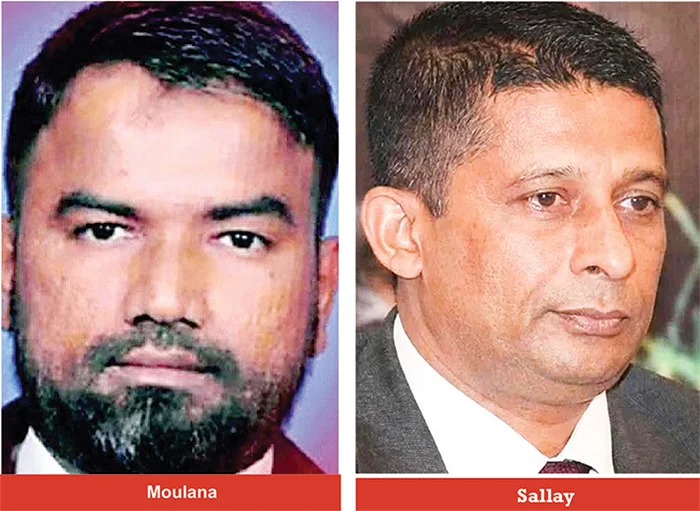
Retired Maj. Gen. Suresh Sallay’s recent arrest attracted internatiattention. His long-expected arrest took place ahead of the seventh anniversary of the bombings. Multiple blasts claimed the lives of nearly 280 people, including 45 foreigners. State-owned international news television network, based in Paris, France 24, declared that arrest was made on the basis of information provided by a whistleblower. The French channel was referring to Hanzeer Azad Moulana, who earlier sought political asylum in the West and one-time close associate of State Minister Sivanesathurai Chandrakanthan aka Pilleyan. May be the fiction he wove against Pilleyan and others may have been to strengthen his asylum claim there. Moulana is on record as having told the British Channel 4 that Sallay allowed the attack to proceed with the intention of influencing the 2019 presidential election. The French news agency quoted an investigating officer as having said: “He was arrested for conspiracy and aiding and abetting the Easter Sunday attacks. He has been in touch with people involved in the attacks, even recently.”
****
Suresh Sallay of the Directorate of Military Intelligence (DMI) received the wrath of Yahapalana Prime Minister Ranil Wickremesinghe, in 2016, over the reportage of what the media called the Chavakachcheri explosives detection made on March 30, 2016. Premier Wickremesinghe found fault with Sallay for the coverage, particularly in The Island. Police arrested ex-LTTE child combatant Edward Julian, alias Ramesh, after the detection of one suicide jacket, four claymore mines, three parcels containing about 12 kilos of explosives, to battery packs and several rounds of 9mm ammunition, from his house, situated at Vallakulam Pillaiyar Kovil Street. Chavakachcheri police made the detection, thanks to information provided by the second wife of Ramesh. Investigations revealed that the deadly cache had been brought by Ramesh from Mannar (Detection of LTTE suicide jacket, mines jolts government: Fleeing Tiger apprehended at checkpoint, The Island, March 31, 2016).
The then Jaffna Security Forces Commander, Maj. Gen. Mahesh Senanayake, told the writer that a thorough inquiry was required to ascertain the apprehended LTTE cadre’s intention. The Chavakachcheri detection received the DMI’s attention. The country’s premier intelligence organisation meticulously dealt with the issue against the backdrop of an alleged aborted bid to revive the LTTE in April 2014. Of those who had been involved in the fresh terror project, three were killed in the Nedunkerny jungles. There hadn’t been any other incidents since the Nedunkerny skirmish, until the Chavakachcheri detection.
Piqued by the media coverage of the Chavakachcheri detection, the Sirisena-Wickremesinghe administration tried to silence the genuine Opposition. As the SLFP had, contrary to the expectations of those who voted for the party at the August 2015 parliamentary elections, formed a treacherous coalition with the UNP, the Joint Opposition (JO) spearheaded the parliamentary opposition.
The Criminal Investigation Department (CID) questioned former External Affairs Minister and top JO spokesman, Prof. G.L. Peiris, over a statement made by him regarding the Chavakachcheri detection. The former law professor questioned the legality of the CID’s move against the backdrop of police declining to furnish him a certified copy of the then acting IGP S.M. Wickremesinghe’s directive that he be summoned to record a statement as regards the Chavakachcheri lethal detection.
One-time LTTE propagandist Velayutham Dayanidhi, a.k.a. Daya Master, raised with President Maithripala Sirisena the spate of arrests made by law enforcement authorities, in the wake of the Chavakachcheri detection. Daya Master took advantage of a meeting called by Sirisena, on 28 April, 2016, at the President’s House, with the proprietors of media organisations and journalists, to raise the issue. The writer having been among the journalists present on that occasion, inquired from the ex-LETTer whom he represented there. Daya Master had been there on behalf of DAN TV, Tamil language satellite TV, based in Jaffna. Among those who had been detained was Subramaniam Sivakaran, at that time Youth Wing leader of the Illankai Thamil Arasu Kadchi (ITAK), the main constituent of the now defunct Tamil National Alliance. In addition to Sivakaran, the police apprehended several hardcore ex-LTTE cadres (LTTE revival bid confirmed: TNA youth leader arrested, The Island April 20, 2016).
Ranil hits out at media
Subsequent inquiries revealed the role played by Sivakaran in some of those wanted in connection with the Chavakachcheri detection taking refuge in India. When the writer sought an explanation from the then TNA lawmaker, M.A. Sumanthiran, regarding Sivakaran’s arrest, the lawyer disowned the Youth Wing leader. Sumanthiran emphasised that the party suspended Sivakumaran and Northern Provincial Council member Ananthi Sasitharan for publicly condemning the TNA’s decision to endorse Maithripala Sirisena’s candidature at the 2015 presidential election (Chava explosives: Key suspects flee to India, The Island, May 2, 2016).
Premier Wickremesinghe went ballistic on May 30, 2016. Addressing the 20th anniversary event of the Sri Lanka Muslim Media Forum, at the Sports Ministry auditorium, the UNP leader castigated the DMI. Alleging that the DMI had been pursuing an agenda meant to undermine the Yahapalana administration, Wickremesinghe, in order to make his bogus claim look genuine, repeatedly named the writer as part of that plot. Only Wickremesinghe knows the identity of the idiot who influenced him to make such unsubstantiated allegations. The top UNPer went on to allege that The Island, and its sister paper Divaina, were working overtime to bring back Dutugemunu, a reference to war-winning President Mahinda Rajapaksa. A few days later, sleuths from the Colombo Crime Detection Bureau (CCD) visited The Island editorial to question the writer where lengthy statements were recorded. The police were acting on the instructions of the then Premier, who earlier publicly threatened to send police to question the writer.
In response to police queries about Sallay passing information to the media regarding the Chavakachcheri detection and subsequent related articles, the writer pointed out that the reportage was based on response of the then ASP Ruwan Gunasekera, AAL and Sumanthiran, as had been reported.
Wickremesinghe alleged, at the Muslim media event, that a section of the media manipulated coverage of certain incidents, ahead of the May Day celebrations.
In early May 2016 Wickremesinghe disclosed that he received assurances from the police, and the DMI, that as the LTTE had been wiped out the group couldn’t stage a comeback. The declaration was made at the Lakshman Kadirgamar Institute for International Relations and Strategic Studies (LKIIRIS) on 3 May 2016. Wickremesinghe said that he sought clarifications from the police and the DMI in the wake of the reportage of the Chavakachcheri detection and related developments (PM: LTTE threat no longer exists, The Island, May 5, 2016).
The LTTE couldn’t stage a comeback as a result of measures taken by the then government. It would be a grave mistake, on our part, to believe that the eradication of the LTTE’s conventional military capacity automatically influenced them to give up arms. The successful rehabilitation project, that had been undertaken by the Rajapaksa government and continued by successive governments, ensured that those who once took up arms weren’t interested in returning to the same deadly path.
In spite of the TNA and others shedding crocodile tears for the defeated Tigers, while making a desperate effort to mobilise public opinion against the government, the public never wanted the violence to return. Some interested parties propagated the lie that regardless of the crushing defeat suffered in the hands of the military, the LTTE could resume guerilla-type operations, paving the way for a new conflict. But by the end of 2014, and in the run-up to the presidential election in January following year, the situation seemed under control, especially with Western countries not wanting to upset things here with a pliant administration in the immediate horizon. Soon after the presidential election, the government targeted the armed forces. Remember Sumanthiran’s declaration that the ITAK Youth Wing leader Sivakaran had been opposed to the TNA backing Sirisena at the presidential poll.
The US-led accountability resolution had been co-sponsored by the Sirisena-Wickremesinghe duo to appease the TNA and Tamil Diaspora. The Oct. 01, 2016, resolution delivered a knockout blow to the war-winning armed forces. The UNP pursued an agenda severely inimical to national interests. It would be pertinent to mention that those who now represent the main Opposition, Samagi Jana Balawegaya (SJB), were part of the treacherous UNP.
Suresh moved to Malaysia
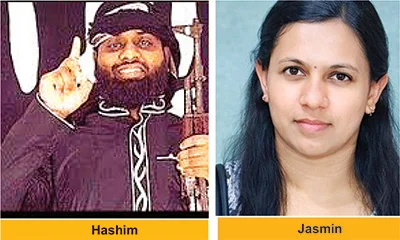 The Yahapalana leadership resented Sallay’s work. They wanted him out of the country at a time a new threat was emerging. The government attacked the then Justice Minister Dr. Wijeyadasa Rajapakshe, PC, who warned of the emerging threat from foreign-manipulated local Islamic fanatics on 11 Nov. 2016, in Parliament. Rajapakshe didn’t mince his words when he underscored the threat posed by some Sri Lanka Muslim families taking refuge in Syria where ISIS was running the show. The then government, of which he was part o,f ridiculed their own Justice Minister. Both Sirisena and Wickremesinghe feared action against extremism may cause erosion of Muslim support. By then Sallay, who had been investigating the deadly plot, was out of the country. The Yahapalana government believed that the best way to deal with Sallay was to grant him a diplomatic posting. Sally ended up in Malaysia, a country where the DMI played a significant role in the repatriation of Kumaran Pathmanathan, alias KP, after his arrest there.
The Yahapalana leadership resented Sallay’s work. They wanted him out of the country at a time a new threat was emerging. The government attacked the then Justice Minister Dr. Wijeyadasa Rajapakshe, PC, who warned of the emerging threat from foreign-manipulated local Islamic fanatics on 11 Nov. 2016, in Parliament. Rajapakshe didn’t mince his words when he underscored the threat posed by some Sri Lanka Muslim families taking refuge in Syria where ISIS was running the show. The then government, of which he was part o,f ridiculed their own Justice Minister. Both Sirisena and Wickremesinghe feared action against extremism may cause erosion of Muslim support. By then Sallay, who had been investigating the deadly plot, was out of the country. The Yahapalana government believed that the best way to deal with Sallay was to grant him a diplomatic posting. Sally ended up in Malaysia, a country where the DMI played a significant role in the repatriation of Kumaran Pathmanathan, alias KP, after his arrest there.
Having served the military for over three cadres, Sallay retired in 2024 in the rank of Major General. Against the backdrop of his recent arrest, in connection with the ongoing investigation into the 2019 Easter Sunday carnage, The Island felt the need to examine the circumstances Sallay ended up in Malaysia at the time. Now, remanded in terms of the Prevention of terrorism Act (PTA), he is being accused of directing the Easter Sunday operation from Malaysia.
Pivithuru Hela Urumaya leader and former Minister Udaya Gammanpila has alleged that Sallay was apprehended in a bid to divert attention away from the deepening coal scam. Having campaigned on an anti-corruption platformm in the run up to the previous presidential election, in September 2024, the Parliament election, in November of the same year, and local government polls last year, the incumbent dispensation is struggling to cope up with massive corruption issues, particularly the coal scam, which has not only implicated the Energy Minister but the entire Cabinet of Ministers as well.
The crux of the matter is whether Sallay actually met would-be suicide bombers, in February 2018, in an estate, in the Puttalam district, as alleged by the UK’s Channel 4 television, like the BBC is, quite famous for doing hatchet jobs for the West. This is the primary issue at hand. Did Sallay clandestinely leave Malaysia to meet suicide bombers in the presence of Hanzeer Azad Moulana, one-time close associate of State Minister Sivanesathurai Chandrakanthan, aka Pilleyan, former LTTE member?
The British channel raised this issue with Sallay, in 2023, at the time he served as Director, State Intelligence (SIS). Sallay is on record as having told Channel 4 Television that he was not in Sri Lanka the whole of 2018 as he was in Malaysia serving in the Sri Lankan Embassy there as Minister Counsellor.
Therefore, the accusation that he met several members of the National Thowheeth Jamaath (NTJ), including Mohamed Hashim Mohamed Zahran, in Karadipuval, Puttalam, in Feb. 2018, was baseless, he has said.
The intelligence officer has asked the British television station to verify his claim with the Malaysian authorities.
Responding to another query, Sallay had told Channel 4 that on April 21, 2019, the day of the Easter Sunday blasts, he was in India, where he was accommodated at the National Defence College (NDC). That could be verified with the Indian authorities, Sallay has said, strongly denying Channel 4’s claim that he contacted one of Pilleyan’s cadres, over, the phone and directed him to pick a person outside Hotel Taj Samudra.
According to Sallay, during his entire assignment in Malaysia, from Dec. 2016 to Dec. 2018, he had been to Colombo only once, for one week, in Dec. 2017, to assist in an official inquiry.
Having returned to Colombo, Sallay had left for NDC, in late Dec. 2018, and returned only after the conclusion of the course, in November 2019.
Sallay has said so in response to questions posed by Ben de Pear, founder, Basement Films, tasked with producing a film for Channel 4 on the Easter Sunday bombings.
The producer has offered Sallay an opportunity to address the issues in terms of Broadcasting Code while inquiring into fresh evidence regarding the officer’s alleged involvement in the Easter Sunday conspiracy.
The producer sought Sallay’s response, in August 2023, in the wake of political upheaval following the ouster of Gotabaya Rajapaksa, elected at the November 2019 presidential election.
At the time, the Yahapalana government granted a diplomatic appointment to Sallay, he had been head of the Directorate of Military Intelligence (DMI). After the 2019 presidential election, President Gotabaya Rajapaksa named him the Head of SIS.
The Basement Films has posed several questions to Sallay on the basis of accusations made by Hanzeer Azad Moulana.
In response to the film producer’s query regarding Sallay’s alleged secret meeting with six NTJ cadres who blasted themselves a year later, Sallay has questioned the very basis of the so called new evidence as he was not even in the country during the period the clandestine meeting is alleged to have taken place.
Contradictory stands
Following Sajith Premadasa’s anticipated defeat at the 2019 presidential election, Harin Fernando accused the Catholic Church of facilitating Gotabaya Rajapaksa’s victory. Fernando, who is also on record as having disclosed that his father knew of the impending Easter Sunday attacks, pointed finger at the Archbishop of Colombo, Rt. Rev Malcolm Cardinal Ranjith, for ensuring Gotabaya Rajapaksa’s victory.
Former President Maithripala Sirisena, as well as JVP frontliner Dr. Nalinda Jayathissa, accused India of masterminding the Easter Sunday bombings. Then there were claims of Sara Jasmin, wife of Katuwapitiya suicide bomber Mohammed Hastun, being an Indian agent who was secretly removed after the Army assaulted extremists’ hideout at Sainthamaruthu in the East. What really had happened to Sara Jasmin who, some believe, is key to the Easter Sunday puzzle.
Then there was huge controversy over the arrest of Attorney-at-Law Hejaaz Hizbullah over his alleged links with the Easter Sunday bombers. Hizbullah, who had been arrested in April 2020, served as lawyer to the extremely wealthy spice trader Mohamed Yusuf Ibrahim’s family that had been deeply involved in the Easter Sunday plot. Mohamed Yusuf Ibrahim had been on the JVP’s National List at the 2015 parliamentary elections. The lawyer received bail after two years. Two of the spice trader’s sons launched suicide attacks, whereas his daughter-in-law triggered a suicide blast when police raided their Dematagoda mansion, several hours after the Easter Sunday blasts.
Investigations also revealed that the suicide vests had been assembled at a factory owned by the family and the project was funded by them. It would be pertinent to mention that President Gotabaya Rajapaksa’s government never really bothered to conduct a comprehensive investigation to identify the Easter Sunday terror project. Perhaps, their biggest failure had been to act on the Presidential Commission of Inquiry (PCoI) recommendations. Instead, President Rajapaksa appointed a six-member committee, headed by his elder brother, Chamal Rajapaksa, to examine the recommendations, probably in a foolish attempt to improve estranged relations with the influential Muslim community. That move caused irreparable damage and influenced the Church to initiate a campaign against the government. The Catholic Church played quite a significant role in the India- and US-backed 2022 Aragalaya that forced President Rajapaksa to flee the country.
Interested parties exploited the deterioration of the national economy, leading to unprecedented declaration of the bankruptcy of the country in April 2022, to mobilie public anger that was used to achieve political change.
-

 Opinion5 days ago
Opinion5 days agoJamming and re-setting the world: What is the role of Donald Trump?
-

 Features5 days ago
Features5 days agoAn innocent bystander or a passive onlooker?
-

 Features2 days ago
Features2 days agoBrilliant Navy officer no more
-

 Features6 days ago
Features6 days agoRatmalana Airport: The Truth, The Whole Truth, And Nothing But The Truth
-

 Opinion2 days ago
Opinion2 days agoSri Lanka – world’s worst facilities for cricket fans
-

 Business6 days ago
Business6 days agoIRCSL transforms Sri Lanka’s insurance industry with first-ever Centralized Insurance Data Repository
-

 Business5 days ago
Business5 days agoAn efficacious strategy to boost exports of Sri Lanka in medium term
-

 Features3 days ago
Features3 days agoOverseas visits to drum up foreign assistance for Sri Lanka


